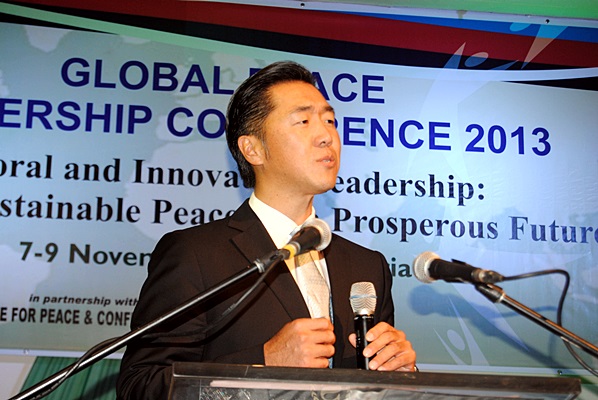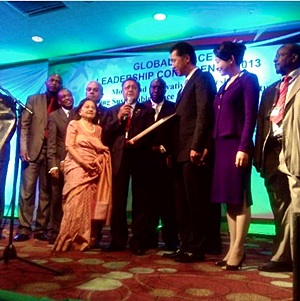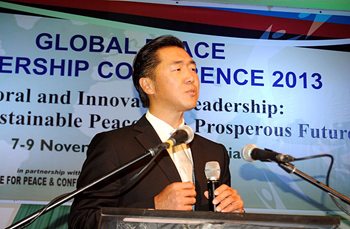The following is a speech that Dr. Moon delivered at the opening plenary of the Global Peace Leadership Conference in Abuja, Nigeria, held at the Abuja Sheraton Hotel from November 7-9, 2013.

Dr. Hyun Jin Moon urged Nigeria to become a leader of moral and innovative leadership in Africa. (Photo Credit: NewsIs)Your excellencies, distinguished participants, ladies and gentlemen:It is a great honor to join with you here today in Abuja for this very important conference on “Moral and Innovative Leadership: Building Sustainable Peace for a Prosperous Future.”
This is a theme of the greatest significance for this nation of Nigeria, the region of West Africa and the entire continent of Africa as we stand at this moment of historic transition. That is why addressing the fundamental issues of a new leadership paradigm to propel this nation forward and all of Africa, is so important in the history of not just Nigeria but this entire continent.
I would like to express my special appreciation to His Excellency President Goodluck Jonathan for contributing his input and support of this initiative. Among the many distinguished participants who are here with us today, I would like to give special recognition to our illustrious friend and many ways mentor, Sir James Mancham, founding president of Seychelles and former President Amani Karume of Zanzibar for launching the African Presidential Leadership Mission on Peacebuilding; I would also especially like to give my thanks to the chairman of GPF Africa, my very good friends and someone who constantly keeps me on my toes, Dr. Manu Chandaria of Comcraft Chairman and my good friend from the United Nations Dr. Markendey Rai, both of whom are members of GPF’s Global Leadership Council. Could you please give them a round of applause.
Particular recognition should be given to the many religious leaders and traditional rulers who have contributed to the One Family Under God campaign of peacebuilding here in Nigeria with GPF including Archbishop Cardinal John Onaiyekan, I hope I’m saying that right, representatives of the Sultan of Sokoto, Bishop Sunday Onouha, Reverend John Hayab and Sheik Maraya of Kaduna, among many, many others. Please forgive me if I did not pronounce your name correctly.
This conference has been organized by the Global Peace Foundation in partnership with the Institute for Peace and Conflict Resolution. However, many other people and organizations have joined with us, together as owners of this cause and worked tirelessly to make this conference, and the subsequent “One Family under God” campaign, a resounding success. Please give them all a round of applause.
I particularly want to appreciate the Nigerian Inter-Faith Action Association and all the other faith leaders engaged in this work. We would not be here today if it was not for their sincere devotion and ownership over this powerful vision. Could we give them all a round of applause?
Ladies and Gentlemen, Africa today stands atop a new pinnacle with the potential of climbing even higher in its very near future. Dramatic new possibilities are opening up. The world is beginning to see the potential of Africa. The continent as a whole is growing faster than any other region in the world with a $2 trillion economy.
By 2035 the African workforce will be larger than that of China’s.The era of military strongmen, coup détats and civil unrest seems to be in the decline, despite the often-jaded coverage of this region by the international press corps.
But what’s even more promising is the possibility of stability, peace and prosperity through the rise of constitutional democratic regimes, a process that is engaging more and more Africans in actively shaping the futures of their nations and the continent as a whole.

Dr. Hyun Jin and Dr. Jun Sook Moon with Mrs. Aruna and Dr. Manu Chandaria and Chesuwa Kaunda at the opening plenary of the Global Peace Leadership Conference Abuja 2013. (Photo Credit: NewsIs)
These are significant developments since they mark a period of African self-determination far removed from the traditional paternalism of the developed world, that dominated the relationship between the West and this continent for the last half century.
As a Korean who witnessed my birth-nation’s rise in 60 short years to become one of the largest, leading economies through its self-reliance movement, I am confidently optimistic about the changes that are happening in Africa and especially here in Nigeria.
Within Africa, Nigeria is positioned to be a major leader. You have the most populous nation with a highly educated elite and tremendous natural resources. You also have a reputation as a very spiritual people.
In fact, Nigeria’s most valuable resource is not its resources but its great people. Two of the great faith traditions, Christianity and Islam, are represented here in almost equal numbers and you have a tradition of cooperation between the faiths that could offer a lesson to the world, despite your current challenges.
However, we recognize all too clearly that the prospect for peace and progress faces serious obstacles. The two major threats are conflict – between ethnic groups, and increasingly from extremists fueled by distorted and radical understandings of their faith traditions – and corruption.
In Nigeria you have experienced conflict of both sorts, through the violence of Boko Haram, and in the Delta region over the distribution of wealth from oil resources. Corruption remains a major drain on the economy and prevents the great wealth generated by Nigeria’s natural resources from benefiting the Nigerian people and Nigerian society as a whole.
The time is ripe for Africans to take responsibility for shaping your own destiny. That means exercising true leadership. True leadership does not mean wielding power for its own sake.
True leadership is moral and innovative leadership whose power lies in the moral authority rooted in core universal principles and shared moral values.We have witnessed in the past century, compelling examples such leadership in the lives of people like Mahatma Gandhi, Martin Luther King, and Nelson Mandela. Each of them overcame great material forces arrayed against them, through the power and the truth of the universal principles and values to which they gave voice.
Moral leadership is more precious for the future of a nation than gold, diamonds and oil, under the soil. It is guided by a common vision that reflects the most fundamental human aspirations, conforms to the universal spiritual principles that govern human life, and is expressed in shared moral values that can ultimately form a global ethic.
That vision is the simple yet profound idea that all people, regardless of race, nationality, religion, or culture, are members of One Family under God.
This proposition has implicit within it certain fundamental principles.
First, each human being has unique value and dignity from the Creator and should be treated accordingly. Second, since we share a common Source or Origin, therefore, in the words of the American Declaration of Independence, “all men are created equal and are endowed by the Creator with certain unalienable rights.”
These rights originate with the Creator and cannot be removed or denied by any government or other human institution. Third, as members of one family sharing a common origin, we also share a common responsibility for one another and for the fate of our common destinies.
Within this framework of moral leadership, innovation can take place. The innovative leader develops concrete approaches to critical issues through the lens of this common spiritual vision rooted in universal principles and shared moral values, drawing upon human beings’ natural creativity.
I have always felt a great affinity for Africa and African people because of the great potential I see here. More and more experts are pointing out bright economic prospects, but the potential I see that can be truly transformative force on this continent is spiritual.
When I look at all of you gathered here for this conference and hear about the work you are doing, I see many ‘owners’ who are ready to take responsibility for the future of this nation of Nigeria. I was inspired to learn that religious leaders and traditional rulers here have grasped the power of a compelling vision and on your own initiative launched the One Family under God campaign here, in partnership with GPF.
Through religious and traditional leaders, such as the Emir of Abuja, the One Family under God message is being spread to communities here in Nigeria. There it serves as a spiritual antidote to the Boko Haram message of domination, division, and conflict.
Through this work, Nigeria, with the even balance of Christian and Muslim in your population, is uniquely positioned to create a model of interfaith cooperation that will have global impact in mitigating the effects of religious radicalism.
Ladies and gentlemen, I am a man of faith and I believe that God’s Providence is calling faith leaders to be the peacemakers in this age.The threat of religious extremism cannot be resolved by political or economic solutions alone. A true and lasting resolution must be rooted in faith and expressed through practical spirituality.
To that end, faith leaders must step beyond the confines of their own sectarian or denominational traditions, and act together as true spiritual leaders, representing God’s hope for the world, not just the interests of a particular religion.
Such a movement will raise humanity to a new level of understanding of the ways of peace and reconciliation, establishing new norms that become the foundation of a new global ethic.Nigeria stands on the frontline of the dangerous division within the Abrahamic tradition, between Islam and Christianity. Abraham was blessed and his descendants after him, because of his faith and devotion in one God.
How ironic that today many of the heirs of that tradition, whether it be with the Christian or Muslim, who accuse each other of worshiping different gods.People of faith need to step back and reflect deeply on the true meaning of the original message taught by their founders.
None of the great faith traditions teaches division, domination, and conflict, though all of them have been distorted to promote such things at times. Jesus taught, “Blessed are the peacemakers, for they will be called children of God.” What higher honor could there be than that? In Islam, the very words of greeting, “As salamu alykum,” mean “peace be upon you,” and the word “Islam” itself has its roots in words meaning peace, and wholeness.
We who inherit traditions must be true to the ideal of peace under God expressed at the heart of their teachings, heal division, and bring the family of Abraham to become one.The challenge is global in scope as Christianity and Islam face each other in tense and sometimes violent relationships in many different parts of the world.
That is why GPF has made the promotion of cooperation among faiths the first of our three key focus areas for promoting global peace. We have worked to bring Christian and Muslim communities to cooperate together in conflict areas such as Mindanao of the Philippines.
Next month in Malaysia, a country of diverse faiths, including Islam, Christianity, and Hinduism, the annual Global Peace Convention will highlight the importance of interfaith cooperation and establish a platform for future work in the Middle East.
The problem of divisions among faith traditions is great and extends beyond the Abrahamic tradition. Since the end of the Cold War and its two blocs of competing ideology, the global geopolitical dynamic has been reconfigured by the power of politicized and radicalized versions of the great faith traditions.
The threat that this represents is extreme and can only be countered by true spiritual leaders, true men and women of God, stepping beyond the boundaries of their own traditions, to work in common cause with those of other faith traditions, while each drawing on the deep strength and original vision of their own tradition.
This is truly carrying out the work of God, creating a world where all live as members of One Family under God, that can find peace, security and prosperity. Such a movement will transform Nigeria, and its effects will ripple out across the region, throughout the continent, into the Middle East, until it ultimately encompasses the world.
Within Nigeria itself, the impact of a powerfully active movement of cooperation among faiths will not only erode the influence of religious radicalism, but will also address ethnic and tribal divisions. It can also be a powerful force against corruption, by speaking out for the highest standards of public service and promoting and protecting those ready to uphold them.
Such a faith movement can also tackle poverty, health, education, and other social needs, through initiatives such as the distribution of mosquito nets, acting as non-governmental social agencies.This work will be more effective through drawing on the power of the traditional model of the extended family. Such families, through mutual support, provide a social safety net independent of government. This is in stark contrast to the nuclear family models predominant in developed nations, whose deficits, psychologically, socially, and fiscally are now becoming clear as large numbers of older people rely on underfunded government programs to provide for the elderly.
More important, though, than a social safety net, the extended family provides an ethical and spiritual safety net, nurturing and transmitting cultural tradition and moral standards. This is the core of strong communities that are the building blocks of a healthy society and strong nation.
That is why the strengthening of families and communities is GPF’s second major focus area. The Global Peace Foundation is a young movement, but from the beginning I have invested much of our effort into Africa because of the hope I see there.

Dr. Manu Chandaria presents Dr. Moon with the UN Award given to GPF Kenya in recognition for its work with sustainable peace and youth empowerment.
We began our work in Kenya, in the wake of the terrible 2008 post-election violence, holding public festivals and sponsoring grassroots projects to promote peace and reconciliation. Here in Nigeria I am proud to announce the launch of two projects, the Character and Creativity Initiative (CCI), and the All Lights Village Project, along with the Africa Peace Service Corps.
The large youth populations in Africa will shape the future of their countries for better or worse. CCI will inculcate the moral outlook and the skills needed for them to succeed, and Nigeria can become a pioneer in this movement for all of Africa.
CCI’s approach is innovative because it engages the school and local community in developing a culture that promotes moral and innovative leadership in practical ways. In Kenya, in cooperation with the Ministry of Education there are plans to extend CCI throughout all of Kenyan schools.
The prestigious national think-tank, KIPPRA, reviewed the progress of CCI schools over the past two years and found major improvements in school culture and performance. As a result, the Ministry of Education, has now made character development part of the assessment of successful school performance.
The All Lights Village project, launched in Asia, is now coming to Nigeria. All Lights is pioneering a comprehensive approach to development in rural communities. It begins with bringing solar lamps to villages without electrification. But that is just the starting point for ongoing initiatives that promote the “light” of education, the empowerment of social entrepreneurial capacity-building, and an enduring commitment of community development.
We also have distinguished leaders from the political sphere here with us ready to promote moral and innovative leadership. I would like to congratulate those heads of state, former and present, who are joining together to launch the Africa Leadership Mission on Peacebuilding, Youth Leadership, and Service, here at this conference.
The Leadership Mission will engage former heads of state and research institutions and is modeled on the Latin American Presidential Mission launched last year during the Global Peace Convention at the Carter Presidential Center in Atlanta.
Through the power of moral and innovative leadership rooted in the unifying vision of One Family under God, Nigeria can rise above its present challenges.
Your faith leaders are already working together, in partnership with traditional leaders. Through uniting and cooperating around this powerful moral vision you can give direction and hope to the Nigerian people and hold your political leaders to account.
Nigeria’s faith leaders can show how it is possible for different traditions to unite around shared principles and values to resolve conflict and secure peace. In so doing you will be creating a great benefit for Africa and for the world, by demonstrating a model that others can emulate.
If you can seize the vision of One Family under God and make it into a reality; if the rising generation of young leaders can inherit and practice this vision, then the hope for Nigeria will be bright. Your country can become a light and a true leader in the new emerging Africa, an example and inspiration for other nations to follow.
I urge you to join with me and unite together in pursuit of this great cause so that Nigeria can realize its true destiny.
Thank you and may God bless you and your families

